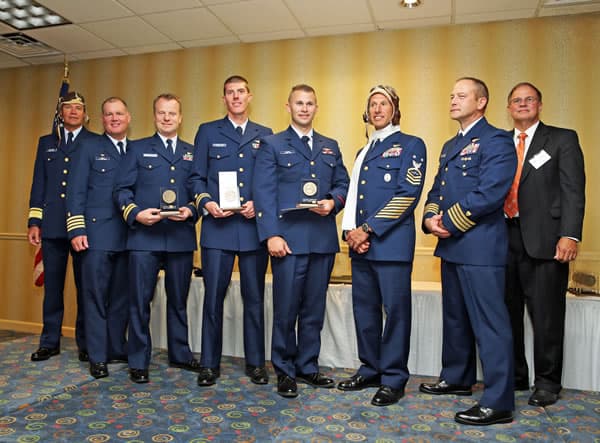The Commander Elmer F. Stone Award goes to the Cape Cod crew of CGNR 2309 in recognition of their efforts on 10 May 2014.
The actions of LT Lee, LT Vanderslaske, AMT1 Underwood, and AMT3 Woods resulted in the saving of a premature baby via medevac. Demonstrating superior airmanship and judgment the crew of CGNR 2309 launched for an emergency medical evacuation of a premature infant on Martha’s Vineyard. Weather at the time of launch direction was 200 foot ceilings, one-half mile visibility and heavy rain and strong, gusty winds. The daunting weather grounded civilian life flight services, leaving the newborn stranded. The patient’s condition required transfer to a neonatal care unit in four hours or less with any delay being detrimental to the survival of the child. Immediately upon notification, the aircrew began to configure the aircraft for a first-in-the-fleet neonatal transport. This required an aircraft configuration change with only the crew available to affect the unique set up. Meanwhile, the pilots coordinated complex aircraft weight and balance calculations to ensure the aircrafts limited cargo capacity was adequate for the delivery. Complicating the case was the inclusion of a three-person specialized medical team and a 455 pound neonatal isolette in addition to the child and family. Upon arriving at Martha’s Vineyard, the crew found the short, narrow, uncontrolled field to be below approach minimums with sustained winds of 48 knots. The crew finally made contact with the field on their second approach and executed a flawless landing. Immediately, the crew assessed the dynamic load and quickly had the patient and team aboard. While executing the mission, the aircraft was flown to landing minimums on four separate occasions at the extreme limits of the aircraft’s aerodynamic capability. Compounding the complexity of this challenging mission, the aircraft suffered a flight control emergency during approach into Boston’s heavily congested airspace, forcing the aircraft to land in a non-standard flap configuration at night and in difficult weather conditions. Not only was this was the first neonatal medical evacuation by an HC-144A, but more importantly, the heroic crew of CGNR 2309 saved the life of the 2.8 pound baby when no one else was able.
Their aeronautical skill and competence under extreme conditions are in keeping with the tradition of Commander Elmer Stone and added a proud chapter to the history of Coast Guard Aviation
